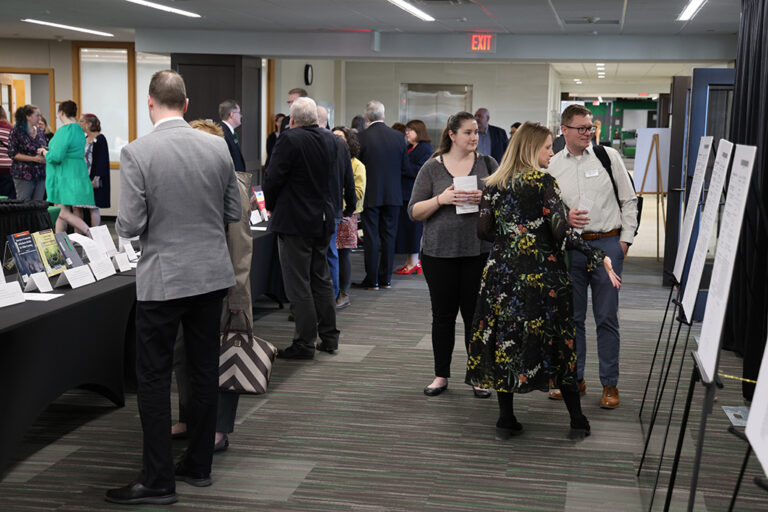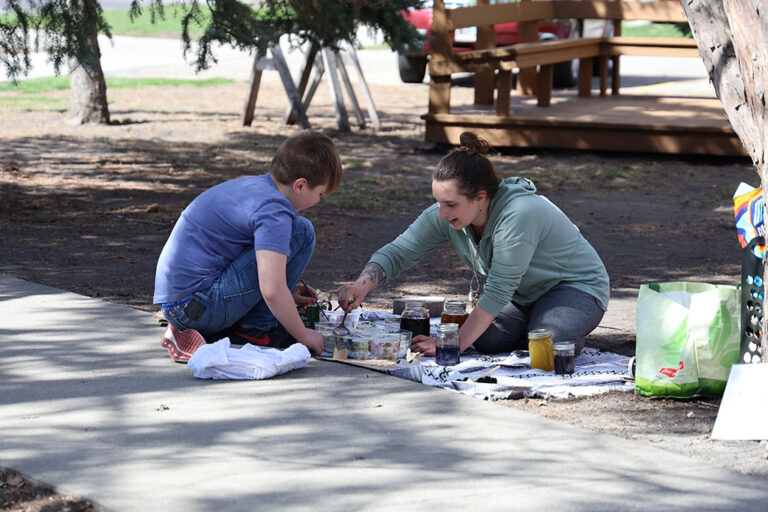Planning today for healthier communities tomorrow
Statewide health care updates highlight Center for Rural Health’s Dakota Conference on Rural and Public Health

Communications Manager Jena Pierce of UND’s Center for Rural Health contributed this story to UND Today.
Some 377 rural and public health leaders gathered in Grand Forks on June 8-10 for the annual Dakota Conference on Rural and Public Health. It was the first face-to-face conference since 2019 due to the pandemic. The three-day conference provided opportunities to learn and share in both formal presentations and discussions with friends and colleagues from the Dakotas and Minnesota.
The pandemic has challenged rural hospitals and clinics, public health units, tribal communities, behavioral health providers and others who attended the conference. The conference focused on looking forward: how to build and move ahead as we work our way through a challenging and changing health dynamic.
The Center for Rural Health at UND initiated the conference 37 years ago and is a primary sponsor. The Center’s mission is to connect resources and knowledge to strengthen the health of people in rural areas, and the Dakota Conference has proven to be a prime way to build that knowledge base, create community capacity and plan for healthier lives.
During COVID-19, Gov. Doug Burgum stated he wanted North Dakota to be the healthiest state in the nation. That is the goal the North Dakota Department of Health and North Dakota Department of Human Services have kept as their focus over the past few years, including during the last state legislative session in 2021. Two plenary sessions at the statewide conference discussed the work done through these entities.
Department of Health
One session focused on work the state is undertaking, including a look at the merger that’s scheduled to take place later this summer between the departments of Health and Human Services.
The State of North Dakota Panel Update featured three statewide leaders: Dr. Nizar Wehbi, state health officer with the North Dakota Department of Health; and with the state Department of Human Services, Chris Jones, executive director; and Pam Sagness, executive policy director. Each gave updates on the ongoing work of their agencies.
Wehbi highlighted the work that happened during the COVID-19 pandemic:
• Working with 28 local public health units
• Hiring 900 temporary employees
• Partnering with 677 different locations, including Federally Qualified Health Centers, long-term care facilities, tribal health agencies, universities, K-12 schools and others
• More than 1 million vaccine doses have been administered
• 1.7 million PCR tests have been completed
He also touched on health equity and disparities that were seen, which led to the creation of four tribal health liaison positions, plus additional community-based professionals to make sure underserved groups are receiving needed services.
Department of Human Services
Jones highlighted the integration of the Department of Health and the Department of Human Services, which will officially become one organization on Sept. 1. A lot of stakeholder input was gathered to plan how to integrate these two agencies.
Jones said, “This is the cornerstone of the integration vision of how North Dakota becomes the healthiest state in the nation, then by reinforcing the foundations of well-being: physical health, behavioral health, and economic health. We know that if kids and families have gaps in those services, they are more likely to go deeper in crisis.”
Sagness focused on behavioral health. In North Dakota, behavioral health includes everything from prevention and wellness, to treatment for addiction or chronic mental health issues.
She continued, “Behavioral health is a positive. We want to promote mental health, but we want to address mental illness. Behavioral health should be treated on equal footing with physical health.”
State Legislative Update
The Health Care Policy Panel: North Dakota Legislative Update session featured four state legislators: Sen. Judy Lee, West Fargo; Rep. Corey Mock, Grand Forks; Rep. Marvin Nelson, Rolla; and Rep. Greg Westlind, Cando. The update included policy addressed during the last session and during the winter/spring of 2021, as well as what the interim committees are currently working on and what could happen during the next session in 2023.
Lee highlighted one of the biggest behavioral health successes of the last two sessions.
“More people now have access to addiction treatment and services than ever before,” she said.
“The substance use disorder (SUD) voucher program was implemented two sessions ago. If someone has a voucher from Medicaid saying they are eligible for care from a local provider, they can go to a private provider to receive care. Due to the success of the program, additional funds were appropriated during this last session to keep the program funded through the biennium. Over 5,000 individuals are now being served because we are reimbursing private providers.”
Lee also highlighted the North Dakota Medicaid 1915(i) State Plan Amendment, which allows North Dakota Medicaid to pay for additional home and community-based services to support individuals with behavioral health conditions.
Nelson shared what the health care committee is working on, such as reimbursement for community health workers and increases in telehealth, including keeping licensing across state lines open and available and issues with prescription drug prices.
Westlind commented how small rural hospitals do not get the same reimbursement for telehealth that larger institutions do. Senate Bill 2179 did not pass during the last session, but he expects it will be brought back again in the upcoming session.
Mock addressed health workforce issues and the need to grow talent in rural areas that will stay in rural communities. He lauded the investment the state made in building the new School of Medicine & Health, which allows North Dakota to train health care professionals who will care for people across the country, but especially in North Dakota. It is expected that health workforce will be a primary legislative concern.
“Nearly three quarters of medical physicians in North Dakota were educated or trained at UND, or did their residency in sync through UND,” Mock said. “As we look at the discussion that will be coming forward, making that connection between the policy need and appropriations is huge and can be very successful in North Dakota.”
Brad Gibbens, acting director of the Center for Rural Health, later commented “we hear this from the rural providers. And it is not just a physician issue, we know nursing is likely at the top of the list. It goes beyond health providers as office staff, plant services, and dietary are in short supply. The health industry has been hit hard by the pandemic.”
Lee reminded everyone that all committee hearings are online for anyone to view. She also encouraged citizens to reach out to their local senators and representatives about issues they have an interest in. Using legis.nd.gov, people throughout North Dakota can find who their local legislators are and how to reach out to them.


